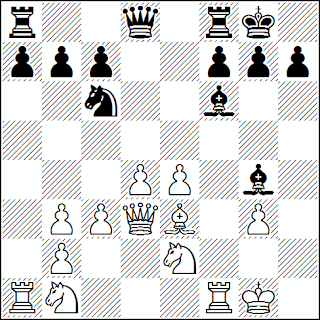I changed my chess blog's account.
Earlier, the address was
jeintaluchess.blogspot.com
From now on, the address is
chessmaletaja.blogspot.com
The new name of the blog is
Chess/Male
"Male" is chess in Estonian language.
However, there is a confusion concerning it.
I realised that no one reads my chess blog and that all people were gathered into the Facebook, the main if not the only advantage of which is the very same fact that all people are gathered into the Facebook.
Thus, I created a chess page in the Facebook with the name
Chess/Male
And I really have some followers there, some Estonian chess players.
Unfortunately, it was impossible to create the username "chess/male" because the sign "/" is prohibited.
Therefore, my chess blog's address in the Facebook is
@chessmale
There, most of my posts are in Estonian.
Afterwards it turned out that some people interpreted this address in the following way:
"male" is the opposition of "female" - as if I did not create the address "chessfemale" only because of I was male.
But I forgot it.
Finally, I decided to return to the Google Blogger, because the technical possibilities in the Facebook are poor, while the Facebook is built on the advertisements, which I very much dislike.
Now, an obstacle arose.
Surprisingly, Google regards the username "chessmale" as being against the community standards. Or I do not now what. Among other things, why they do not think that some words in English language can be insulting if read as words in Estonian language?
The other possibility is that someone got the idea to block me of using that username. Or I do not know. Anyway, there was a possibility to choose the username
"chessmale777"
for example.
However, I chose the username
"chessmaletaja"
If to translate from Estonian to English:
"male" - "chess"
"maletaja" - "chess player"
As it is only a chess blog, I shall not politicise here about the fact that the Estonian word "neeger" is actually neutral in Estonian language, etc. Because I would not use it in the username of my chess blog. However, it is obvious that the community standards are chosen according to the English-speaking world, perhaps according to the U.S. standards.
From now on, this blogger here is in English and about more serious staff.
My Facebook page Chess/Male, on the other hand, remains in Estonian language and can contain some short jokes, recent news, etc.
♘♘♘
FACEBOOK DECLARES THAT MY CHESS BLOG'S LINK IS AGAINST THEIR COMMUNITY STANDARDS
Suddenly it turns out that it is impossible to share my blog posts to the Facebook, because my blog's name supposedly violates their community standards.
Even worse: it was impossible to send a private message about it to my friend (he is an IT-journalist). Facebook declared that my message in the Facebook Messenger contained a link that was against their community standards. Among other things, it shows that they are monitoring and censoring private messages.
Even worse: it was impossible to send a private message about it to my friend (he is an IT-journalist). Facebook declared that my message in the Facebook Messenger contained a link that was against their community standards. Among other things, it shows that they are monitoring and censoring private messages.
Finally, of course, one cannot know the reasons if the reasons have not been presented.
It is a real Kafka.
One can only guess. Some alternative hypotheses. For example, perhaps the chess terminology is regarded as a "violent content"?
Who knows.












